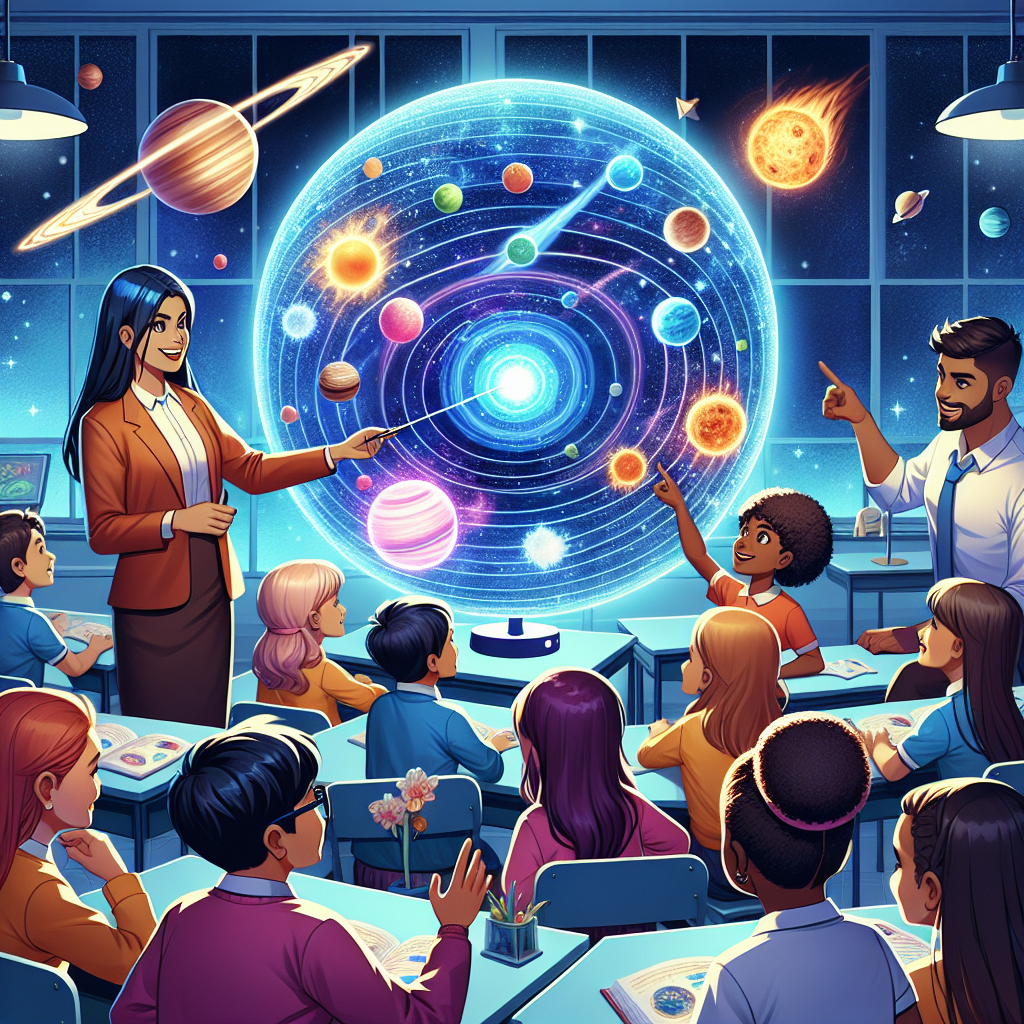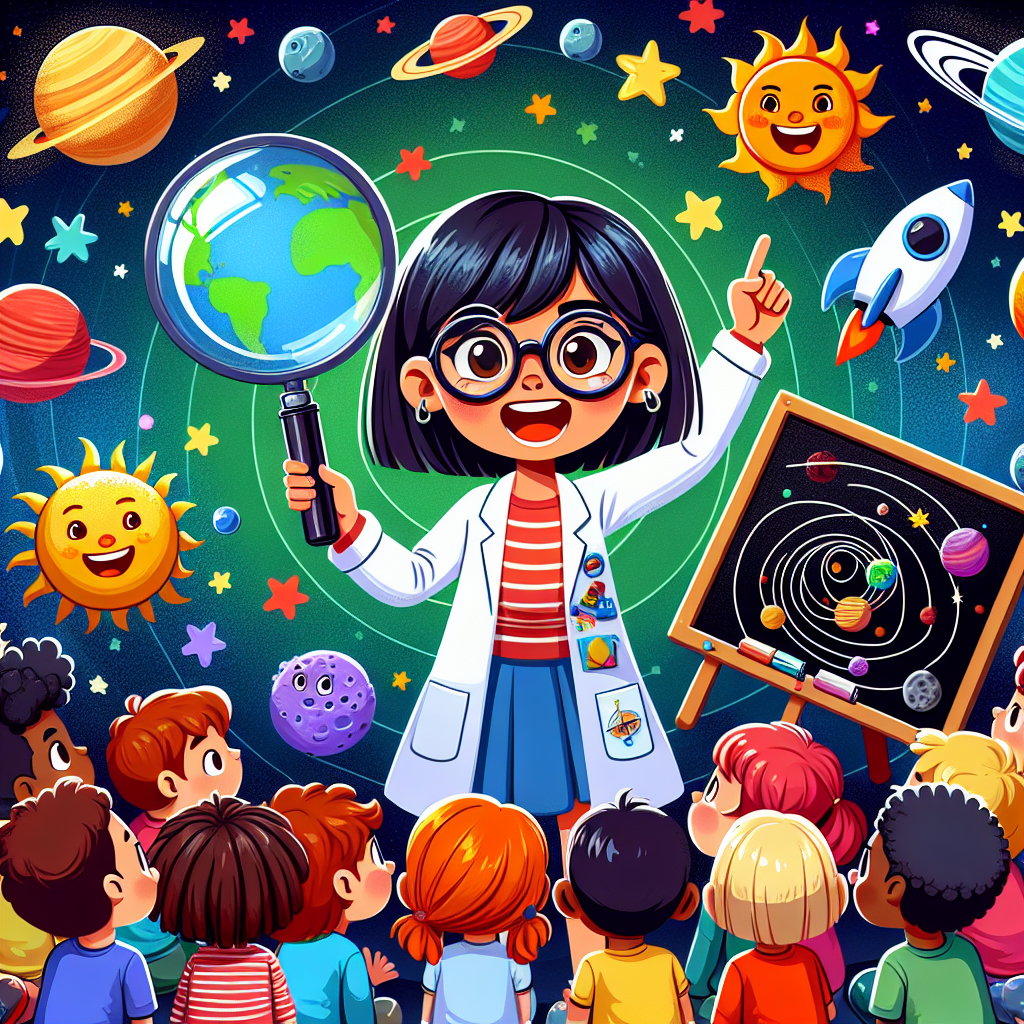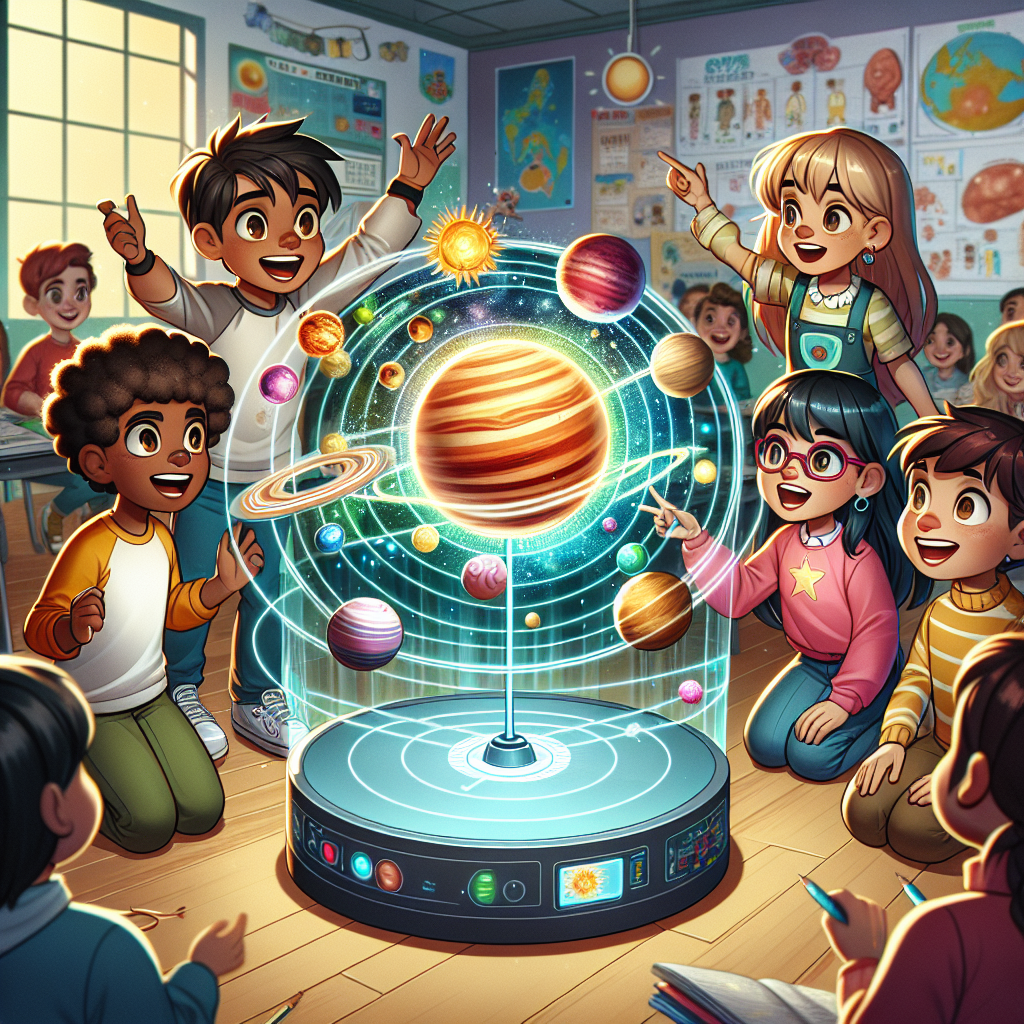Embark on a captivating journey through the wonders of the universe with educational kids shows about the solar system. Aimed at young explorers eager to learn and discover, these shows offer a fun and interactive way to delve into the mysteries of our celestial neighborhood. From majestic planets to awe-inspiring galaxies, young viewers will be mesmerized by colorful animations, fascinating facts, and exciting adventures. With a perfect blend of entertainment and education, these shows make learning about the solar system a thrilling experience. Join us as we take a cosmic leap into the unknown and uncover the secrets of the universe!
The Importance of Educational Kids Shows
-
Engaging and interactive learning experiences for children
Educational kids shows about the solar system offer a unique blend of entertainment and education, captivating young audiences with vibrant visuals, catchy songs, and exciting storytelling. By presenting complex scientific concepts in a simplified and engaging manner, these shows make learning about the solar system fun and interactive for children, fostering a love for science from an early age. -
Stimulate curiosity and interest in science
Through captivating narratives and visually stimulating animations, educational kids shows spark curiosity and ignite a sense of wonder in young viewers about the mysteries of the solar system. By showcasing fascinating facts about planets, stars, and galaxies in a way that is easy for children to understand, these shows inspire a thirst for knowledge and exploration, encouraging kids to ask questions and seek out more information about the universe. -
Reinforce classroom learning in a fun way
Educational kids shows serve as a valuable supplement to formal education, reinforcing the concepts taught in the classroom in a fun and engaging way. By presenting scientific information in a visual and entertaining format, these shows help children solidify their understanding of the solar system while also providing additional context and real-world examples that enhance their learning experience.
Benefits of Educational Kids Shows on the Solar System
-
Introducing complex concepts in a simple and understandable manner:
Educational kids shows on the solar system have the remarkable ability to break down intricate astronomical concepts into bite-sized, easily digestible pieces suitable for young minds. By using engaging visuals, clear language, and relatable examples, these shows simplify complex ideas such as planetary orbits, gravity, and celestial bodies, making them accessible and comprehensible to children. -
Visual aids enhance understanding and retention:
One of the key advantages of educational kids shows about the solar system is their use of visually stimulating graphics and animations. By incorporating colorful illustrations, interactive diagrams, and 3D representations of planets and stars, these shows captivate children’s attention and facilitate a deeper understanding of astronomical principles. Visual aids not only make learning about the solar system more engaging but also help enhance retention by creating lasting mental images that reinforce educational concepts over time. -
Encouraging critical thinking and problem-solving skills:
Educational kids shows on the solar system go beyond mere information delivery; they actively encourage young viewers to think critically and engage in problem-solving activities. By presenting scientific mysteries, exploring hypothetical scenarios, and posing thought-provoking questions, these shows stimulate children’s curiosity and analytical thinking skills. Through interactive quizzes, puzzles, and challenges, kids are prompted to apply their knowledge of the solar system creatively, fostering a sense of discovery and intellectual growth.
Top Educational Kids Shows about the Solar System
“Top Educational Kids Shows about the Solar System”
- “Ready Jet Go!”
- “Ready Jet Go!” is a popular educational kids show that follows a group of friends who explore the solar system with the help of their alien friend, Jet Propulsion.
- The show combines fun adventures with accurate scientific information about the planets, stars, and other celestial bodies in our solar system.
-
Through exciting storylines and engaging characters, “Ready Jet Go!” aims to inspire children’s curiosity about space and astronomy.
-
“The Magic School Bus”
- “The Magic School Bus” is a classic educational kids show that takes students on educational field trips, including journeys through the solar system.
- Led by the adventurous Ms. Frizzle, the show combines entertainment with science to teach children about the wonders of the universe.
-
With its imaginative approach to learning, “The Magic School Bus” sparks children’s interest in space exploration and discovery.
-
“Miles from Tomorrowland”
- “Miles from Tomorrowland” is a futuristic animated series that follows the Callisto family as they travel through space on missions to explore different planets.
- The show blends science fiction elements with real scientific concepts to introduce children to the wonders of the solar system and beyond.
-
Through its exciting adventures and diverse characters, “Miles from Tomorrowland” encourages children to dream big and reach for the stars.
-
“Space Racers”
- “Space Racers” is an animated series that follows a group of young spaceship cadets as they train to become the next generation of space explorers.
- The show combines entertainment with educational content, teaching children about the planets, moons, and other features of the solar system.
-
With its focus on teamwork, problem-solving, and STEM concepts, “Space Racers” inspires children to learn more about the mysteries of outer space.
-
“Cosmos: A Spacetime Odyssey”
- “Cosmos: A Spacetime Odyssey” is a visually stunning documentary series hosted by astrophysicist Neil deGrasse Tyson, which explores the wonders of the universe, including the solar system.
- The show delves deep into scientific concepts, presenting complex ideas in a way that is accessible and engaging for viewers of all ages.
- Through its breathtaking visuals and thought-provoking narrative, “Cosmos: A Spacetime Odyssey” offers a comprehensive exploration of the solar system and our place within it.
Detailed Analysis of Each Show
Top Educational Kids Shows about the Solar System
1. “Cosmic Adventures with Luna and Leo”
- Synopsis and main characters: The show follows Luna, a curious young astronaut, and Leo, her robot companion, on their adventures through the solar system. Together, they explore different planets and moons, encountering various challenges and learning opportunities along the way.
- Educational content covered: “Cosmic Adventures with Luna and Leo” focuses on introducing young viewers to the basics of astronomy, including the order of the planets, their characteristics, and the concept of orbits. The show also delves into topics like gravity, space exploration, and the importance of protecting celestial bodies.
- Reviews and ratings: Parents and educators praise the show for its engaging storytelling and accurate portrayal of scientific concepts. The colorful animation and lovable characters make learning about the solar system fun and accessible for young audiences. “Cosmic Adventures with Luna and Leo” consistently receives high ratings for its educational value and entertainment factor.
2. “Stellar Explorers: Journey through the Cosmos”
- Synopsis and main characters: “Stellar Explorers” follows a group of young space cadets as they embark on a mission to explore the wonders of the cosmos. Led by Captain Nova, the team travels to different planets, moons, and asteroids, uncovering fascinating facts about the solar system.
- Educational content covered: The show covers a wide range of topics related to the solar system, including the formation of planets, the role of the sun, and the significance of space exploration. Viewers learn about the characteristics of each planet, their moons, and the unique features that make our solar system special.
- Reviews and ratings: “Stellar Explorers” is lauded for its detailed scientific accuracy and engaging storytelling. Parents appreciate the show’s emphasis on teamwork, problem-solving, and STEM education. The dynamic characters and exciting adventures keep children entertained while they absorb valuable information about the solar system. “Stellar Explorers” consistently receives positive reviews for its blend of entertainment and educational content.
Interactive Activities to Supplement Learning

One engaging way to enhance children’s understanding of the solar system is through DIY solar system models. By creating these models using simple materials like styrofoam balls, paint, and string, kids can visualize the relative sizes and distances of planets in a hands-on manner. This tactile experience helps solidify concepts such as planetary orbits and the varying characteristics of each celestial body.
Stargazing sessions offer a unique opportunity for young learners to connect with the solar system in real-time. Whether conducted in a backyard with a basic telescope or through virtual stargazing events, observing the moon phases, planets, and constellations fosters a sense of wonder and curiosity about the universe. Encouraging children to identify different celestial bodies enhances their observational skills and instills a deeper appreciation for the vastness of space.
Incorporating educational games and apps into the learning process can make exploring the solar system both fun and informative. Interactive games that challenge players to match planets with their respective characteristics or navigate spacecraft through asteroid fields not only entertain but also reinforce key concepts about our cosmic neighborhood. Similarly, educational apps that offer virtual tours of the solar system or provide quizzes to test knowledge can supplement formal education in an engaging way. By harnessing technology, children can delve into the mysteries of the solar system with excitement and curiosity.
Tips for Parents and Educators
-
Incorporating show themes into everyday learning: One effective way to enhance children’s understanding of the solar system is to integrate concepts and information from educational kids shows into daily activities. For example, parents can discuss the planets, stars, and galaxies during car rides or bedtime stories, reinforcing what children have learned from the shows. Encouraging kids to create drawings or crafts related to the solar system can also help solidify their knowledge in a fun and creative way.
-
Encouraging questions and discussions: Parents and educators should foster a curious and inquisitive mindset in children by encouraging them to ask questions about the solar system. Engaging in open discussions about topics such as the size of planets, the reasons for different seasons, or the possibility of life on other planets can stimulate critical thinking and deepen children’s understanding of the subject. Encouraging children to find answers through research or further exploration can also cultivate their problem-solving skills and independence.
-
Monitoring screen time and balancing with other activities: While educational kids shows about the solar system can be valuable learning tools, it’s essential for parents and educators to monitor children’s screen time and ensure a balance with other activities. Setting limits on daily screen time, incorporating physical play, outdoor exploration, and hands-on experiments can provide a well-rounded educational experience for children. Encouraging activities that involve movement, creativity, and social interaction can complement the learning from educational shows and promote holistic development in children.

Common Misconceptions about the Solar System
The sun revolves around the Earth
One common misconception about the solar system is the belief that the sun revolves around the Earth. This notion stems from early astronomical observations and the geocentric model of the universe proposed by ancient civilizations. However, scientific advancements have shown that the Earth actually orbits around the sun in a complex dance of gravitational forces. This heliocentric model, popularized by astronomers like Copernicus and Galileo, has been widely accepted and proven through empirical evidence.
Pluto being a planet
Another prevalent misconception is the classification of Pluto as a planet. For many years, Pluto was considered the ninth planet in our solar system until its reclassification by the International Astronomical Union in 2006. Pluto’s status was downgraded to that of a dwarf planet due to its size, orbit, and other defining characteristics that distinguished it from the traditional eight planets. This change in classification sparked debates among scientists and enthusiasts alike but highlighted the importance of refining our definitions and understanding of celestial bodies.
All planets have the same climate
A misconception that often arises when discussing the solar system is the assumption that all planets have the same climate. In reality, each planet in our solar system exhibits a unique and diverse range of environmental conditions shaped by factors such as distance from the sun, composition of the atmosphere, and geological features. For example, Venus experiences scorching temperatures due to its thick greenhouse gases, while Mars is known for its cold and arid landscapes. Understanding these differences not only enhances our appreciation of the solar system’s complexity but also underscores the significance of environmental adaptations and planetary dynamics.
Debunking Myths with Educational Shows
In the realm of educational children’s shows about the solar system, a key focus is on debunking common misconceptions that often circulate. By utilizing engaging storytelling techniques and captivating visuals, these shows aim to provide accurate information to young viewers. Through the following strategies, educational programs effectively debunk myths surrounding the solar system:
-
Engaging Storytelling: Educational kids shows employ compelling narratives and characters to explain complex concepts in a simplified manner. By weaving entertaining storylines into the educational content, these shows capture the attention of young audiences and make learning about the solar system an enjoyable experience.
-
Visual Representation: Utilizing vibrant animations and graphics, educational shows present visual representations of the solar system, debunking misconceptions through clear and accessible imagery. By illustrating the relative sizes of planets, their orbits, and other celestial phenomena, these programs help children grasp the realities of our solar system and differentiate them from popular misconceptions.
-
Expert Interviews: Many educational kids shows feature interviews with astronomers, scientists, and space experts who provide valuable insights into the workings of the solar system. By presenting factual information from credible sources, these programs debunk myths and misconceptions, fostering a deeper understanding of astronomy and space exploration among young viewers.
-
Interactive Learning: Some educational shows incorporate interactive elements such as quizzes, puzzles, and hands-on activities to reinforce learning and dispel myths about the solar system. By engaging children in participatory learning experiences, these programs encourage active exploration and critical thinking, enabling them to discern fact from fiction when it comes to celestial bodies and phenomena.

Through the combination of engaging storytelling, visual aids, expert insights, and interactive learning tools, educational kids shows play a vital role in debunking myths about the solar system and nurturing a passion for astronomy in young minds.
Future of Educational Kids Shows on the Solar System
As technology continues to advance, the future of educational kids shows on the solar system holds exciting possibilities for both entertainment and learning. By incorporating new discoveries and advancements in space exploration, these shows can provide children with the most up-to-date information about our cosmic neighborhood. From the latest missions to Mars to the discovery of new exoplanets, educational content can keep kids engaged and informed about the wonders of the universe.
Utilizing virtual reality and augmented reality technologies can offer immersive learning experiences that allow children to explore the solar system in a hands-on way. By putting on VR headsets or using AR apps, kids can feel like they are walking on the surface of the moon or flying through the rings of Saturn. These interactive experiences can make learning about space feel like an adventure, sparking curiosity and excitement in young viewers.
Collaborations with scientists and educators are crucial for ensuring that educational kids shows on the solar system provide accurate and up-to-date content. By working with experts in the field, show creators can ensure that the information presented is both educational and reliable. Whether it’s consulting with astronomers on the depiction of planetary orbits or collaborating with science educators on engaging teaching methods, these partnerships can elevate the quality of educational programming for children.
FAQs: Educational Kids Shows about the Solar System
What are some benefits of watching educational kids shows about the solar system?
Watching educational kids shows about the solar system can help children develop a better understanding of the universe and our place in it. These shows often present complex concepts in a fun and engaging way, making it easier for children to grasp scientific principles. Additionally, these shows can spark a child’s curiosity and interest in space exploration, potentially inspiring them to pursue a career in STEM fields.
Are educational kids shows about the solar system age-appropriate for all children?
Most educational kids shows about the solar system are designed to be age-appropriate for preschoolers and elementary school-aged children. These shows typically present information in a simple and straightforward manner, making it easy for young viewers to understand. However, parents should always preview the content of a show to ensure it aligns with their child’s developmental level and interests.
How can parents enhance their child’s learning experience while watching educational kids shows about the solar system?
Parents can enhance their child’s learning experience by engaging in discussions before, during, and after watching educational kids shows about the solar system. Before watching a show, parents can ask their child questions about what they already know about the solar system and what they would like to learn. During the show, parents can pause to discuss key concepts or ask their child to summarize what they’ve learned. After watching, parents can encourage their child to research further or create projects related to the topics covered in the show.
Are there any recommended educational kids shows about the solar system that parents should consider?
Some popular and highly recommended educational kids shows about the solar system include “The Magic School Bus Lost in Space,” “Ready Jet Go!,” and “Space Racers.” These shows combine entertainment with education, making them enjoyable for children while also teaching them about the solar system and space exploration. Parents can also explore online platforms like NASA Kids’ Club or PBS Kids, which offer a variety of educational resources and interactive games related to the solar system.